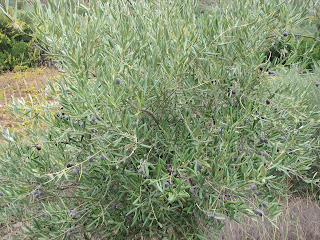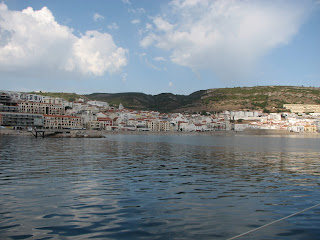Just another little village; it doesn't look much, and passing up and down the river on previous occasions, we had not given it much thought; but what a treat it turned out to be! The other side of our pontoon was a little fishing boat:
A short walk to the main road, and we came here:
Taking the road to the right up into the hills behind the village, here are some of the sights:
Fish, goats, pigs (did you spot them?), hens, olives, grapes, vegetables, not to mention the shrine with the little old lady saying the rosary, (did you notice her?)... what else does one need, along with the fragrant wild herbs on the hillsides? What a pleasure does to just breath in the atmosphere!
This is much the way of life that Our Blessed Lord grew up with, and from which he drew so many images, to such devastating effect, appreciating the perspectives of both the farmer and the fisherman. By His life, death and resurrection, He was able to interpret the basic rhythms of that life, and alone out of all humanity, He was able to open the way out of its apparent claustrophobia and final futility.
It's not that He was indifferent to or inappreciative of the city; but when a man sets off on the dusty road to find his destiny there, it is well for him to keep those country rhythms in his heart. No doubt the knowledge that spring comes after winter, that the seeds' death brings the harvest, helped Him as a man to believe in His own resurrection after death, when He tramped the dusty road to Jerusalem.
It is well for us all to participate in 'the country life' when we can; I'm grateful that Fiona and I took drastic action to do so years ago. At least we should treasure the memory of it all when we can't, and do what we can to encourage it.
And so the matter stands with the nations. Let them value their 'peasants'; let them protect them from the predations of the greedy, and not tax them in order to finance folly; let them not devalue the money by printing more and more of it in order to build castles in the air; and above all let them realise that when we lose the ability to situate our lives in the context of death and sacrifice in order to rise again for that Final Harvest or Great Catch, then we are lost indeed.
Catholics of course help themselves to do so by celebrating the Holy Sacrifice whenever they can; and I think it tells even in the atmosphere of that little restaurant where we rounded off our few hours in Laranjeiras, with a delicious and very reasonable meal featuring their delicious porco preto, reared on the hillside, cooked and served simply but with love!















































